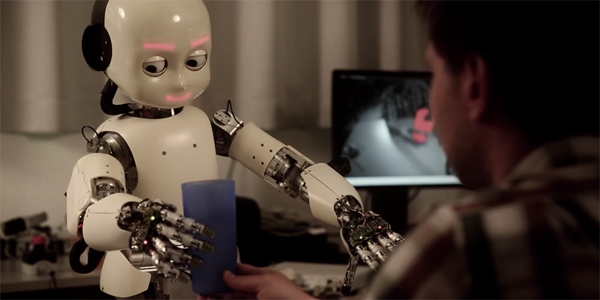7 Technologies That Together Will Disrupt Humanity
A mere seven emerging technologies, while each powerful on their own, have the synergistic potential to disrupt life as we know it. The changes are coming. But are we ready? Has humanity fully prepared for the impacts? Lives will be easier, but at what cost? Guest blogger Bob Gourley dusts off the crystal ball.
Remember this scene from The Graduate?
Mr. McGuire: I just want to say one word to you. Just one word.
Benjamin: Yes, sir.
Mr. McGuire: Are you listening?
Benjamin: Yes, I am.
Mr. McGuire: Plastics.
Turns out, plastics was pretty hot. Great tip, Mr. McGuire. I wonder what, if anything, Benjamin did with that tip. More importantly, what is the one word for today?
I think I have it. The word is Cambric. Cambric the finely woven linen? No, CAMBRIC the finely woven acronym:
Cloud Computing
Artificial Intelligence
Mobility
Big Data
Robotics
Internet of Things
Cybersecurity
Individually, these technologies and the impending improvements are on course to change business and government operations; and even disrupt humanity itself. Here is more on each:
1. Cloud Computing: The efficiencies not only drive down costs, but the agility of this new paradigm will help innovators innovate and developers develop. One new form of cloud computing includes ultra-small data centers, which function as internal clouds. The most versatile easily fit in shipping containers and can be put just about anywhere.
2. Artificial Intelligence (AI): While science fiction made AI a household term, few people realize the reality of this computing field. AI and related disciplines, such as machine learning, enable computers to help humans perform their jobs. With AI increasingly being coupled with incredibly low cost cloud computing, we can expect rapid development of capabilities. In time, the technology will displace many nontechnical jobs, but we should wonder: Will increased efficiencies be worth the lost jobs?
3. Mobility: This is the greatest leap in humanity's ability to stay connected since advent of the spoken word. The only thing better than an always-on, continuously connected supercomputer in your pocket might be ESP. Mobile devices are more than connected supercomputers. They have hundreds of sensors and millions of applications that can fuel and support use cases yet to be imagined.
4. Big Data: For years, people, sensors and computers have generated more information than can be analyzed. Breakthrough methodologies and new scalable data approaches based on Hadoop hold great promise to deciphering increasingly large data sets, but the ethical concerns surrounding potential compromise of privacy and data security will only grow.
5. Robotics: Whether controlled by humans or all on their own, robots already operate in our world. They save lives in hospitals, replace humans doing dangerous jobs, improve farming and oil exploration, endure the hazards of outer space and now fight our wars. Soon they will make driving safe. Like AI, robotics holds a great potential to displace large portions of the work force. Robotics in factories shifted manufacturing from China back to the United States, and we expect the trend to continue. But the bad news is that new robotic-manufacturing plants employ far fewer people.
6. Internet of Things (IoT): Today's Internet connects people, governments, academia and businesses. The IoT will reach far beyond those connections. Largely enabled by embedded computing devices and ubiquitous communications, the IoT reaches vehicles, homes, towns and cities—touching just about every aspect of industry. The technology is expected to improve education, training, safety, security, healthcare, transportation and optimized manufacturing. Ask yourself, do you think any of these IoT disciplines will have adequate cybersecurity? Which bring us to a last salient entry.
7. Cybersecurity: Some of humanity's greatest thinkers, business leaders and computer scientists struggled for years to enhance the computer and network security. It’s clear approaches to date have fallen short. Consider this observation in light of the trends above: We see no indication that these technology disciplines will be more secure than current systems. Cybersecurity must improve, or our future will be one of technology disaster after disaster.
As you think through the impact of these seven capabilities, please let us know your thoughts, particularly how the advancements might change the future of your organization. Future posts will examine emerging solutions that leverage combinations of these technologies, including virtual and augmented reality.
Bob Gourley is a co-founder and partner at Cognitio and publisher of CTOvision.com. He previously was the chief technology officer of the Defense Intelligence Agency.




Comment
I wonder in the future
I wonder in the future technology will take place ,all human will become jobless.
Humans will only become
Humans will only become jobless when the robots can design, program, AND manufacture themselves. In the meantime, we will continue to watch service jobs and manual labor - increasingly to be taken on my machines.
Comments